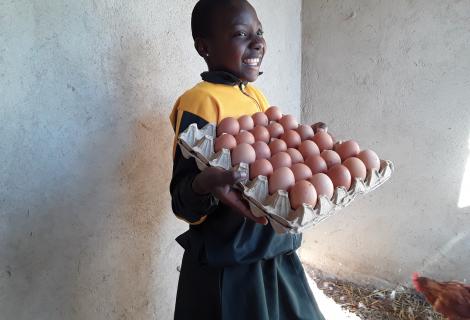Livelihood programmes for schools as girls overcome barriers to education

Major programme impacts so far have seen schools using profits from the livelihood projects to pay school fees for the girls who were not going to school. This is a sustainable programme and an improvement from direct school fees payment. The programme gives the schools control over their projects. So far there are a total of six in-school livelihood programmes initiatives such as poultry, piggery and informal trading running in Nyanga. Most schools in Nyanga are now moving from the ActionAid supported direct school fees payment currently benefitting 121 girls to the livelihood programmes. The schools will continue supporting vulnerable girls to go to school beyond the support offered by ActionAid. About 80 more girls are expected to be part of the livelihood programmes at schools in Nyanga by the end of 2019.
One of the people assisted, a girl named Tiani is an orphan whose father died leaving her mother to fend for the family. The mother struggled to raise funds to pay school fees before the intervention of the livelihood programme. Tiani was enrolled at her school’s livelihood programme in 2018 together with 9 other girls mostly orphans. She was doing Grade five at Nyatate Primary School in Saunyama in 2018, Nyanga.
I want to be a teacher when I finish school. I admire my teacher Mrs. Nyagadza who teaches us practical subjects such as how to look after the chickens from which my school fees is coming from, said Tiani.
Maria Nyagadza, Tiani’s teacher said nine of the 10 girls are orphans. Most of them had stopped going to school prior to the introduction of the project at the school. The 10 children are being assisted under the project where the school is keeping point of lay chickens so that they can sell the eggs. The money from the sale of eggs is being used to pay school fees for the 10 girls whose grades are ranging from Grade 5 to 7.
The school is paying $25 for each child per term (a term is 3 months in Zimbabwe). The school garden is now benefitting from the chicken project in form of organic manure. The chicken project is also providing practical agriculture lessons for the pupils instead of theory and at the same time paying school fees for the children who are responsible for the maintenance of the chickens. At break time the girls come to pick the eggs from the fowl run preparing them for selling to the community, said Nyagadza.
Simukai supplied the 10 girls with 30 point of lay chickens in 2017, whose egg proceeds pay their school fees. They were also supplied with stock feed for three months. Simukai increased the point of lay chickens by another batch of 30 and stock feed for 3 months in 2018 following demand for eggs in the community. The project shifts power from AAZ and Simukai to the school and to the girls as they can make decisions on when to sell, what to use the money and whether to increase the number of the pupils to benefit from the project as the money will not be coming directly from ActionAid. Nyagadza said more school pupils from lower grades at the school would be incorporated in the project once the 10 girls finished Grade 7.
The project is self-sustaining, and this includes the decisions the school makes on what feeds are required, the vaccination that is required, the fees to be paid and what infrastructure development they require for the project, “ said Obert Mhlanga, the Programmes Assistant for Simukai.
At the beginning, we did not have a proper fowl run for the chickens. From the sale of the eggs, we have constructed an up to standard fowl run for our chickens using the project funds, said Nyagadza.
The livelihood programme is part of an AAZ Empowering Girls to Overcome Barriers to Education Programme which is reaching 3 000 girls in and out of school in Nyanga through various intervention. These include direct school fees payment, payment of school fees through livelihoods projects, training on girls’ rights and protection and provision of dignity kits such as sanitary wear and under garments. This programme is part of the ActionAid Zimbabwe Priority 1 which emphasises on empowering women and girls living in poverty and exclusion to challenge the structural causes of violence and secure economic justice.